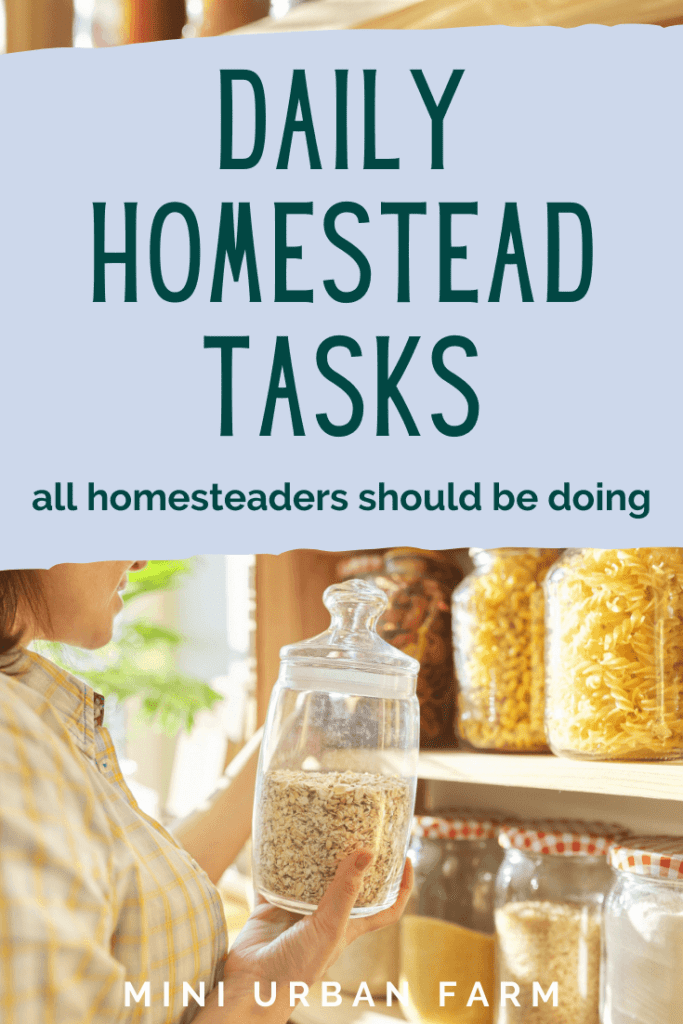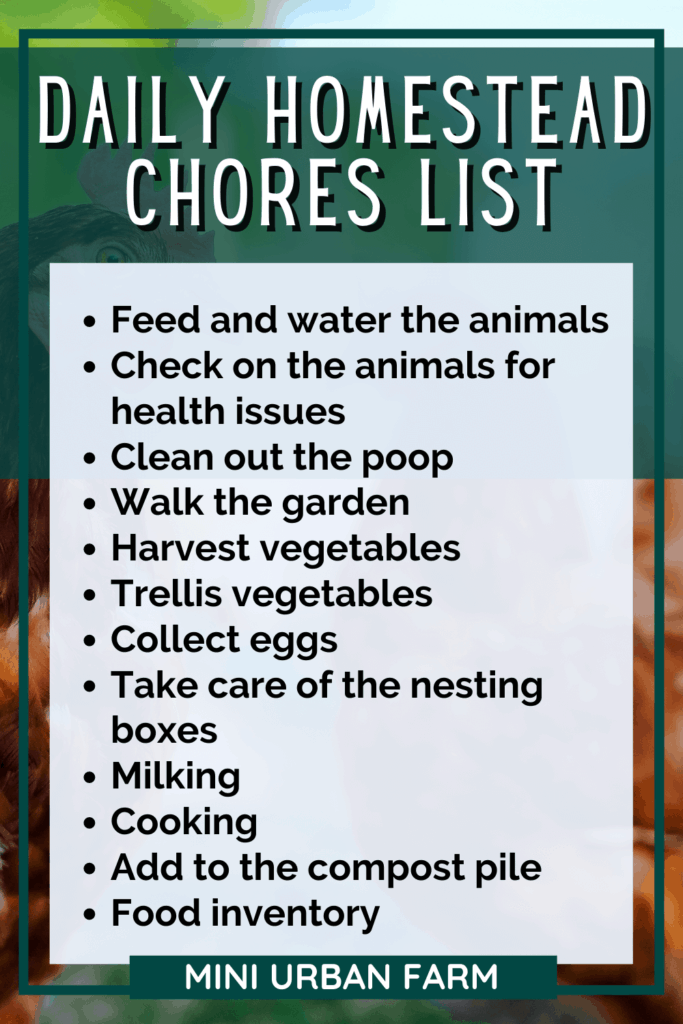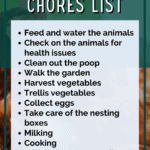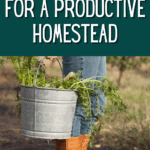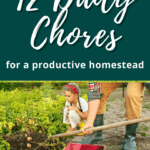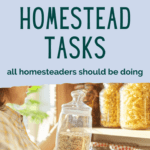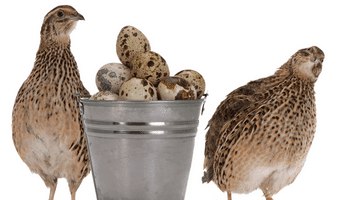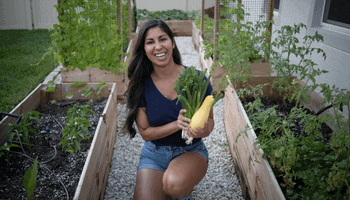Running a homestead can be hard work. You have the garden, the animals, the kids, the hubby – not to mention everything that actually needs to get done! But by keeping this list of daily homestead tasks, you can stay on top of your chores and make sure nothing gets missed!
12 Daily Homestead Tasks Every Homesteader Needs:
- Feed and water the animals
- Check on the animals for health issues
- Clean out the poop
- Walk the garden
- Harvest vegetables
- Trellis vegetables
- Collect eggs
- Take care of the nesting boxes
- Milking
- Cooking
- Add to the compost pile
- Food inventory
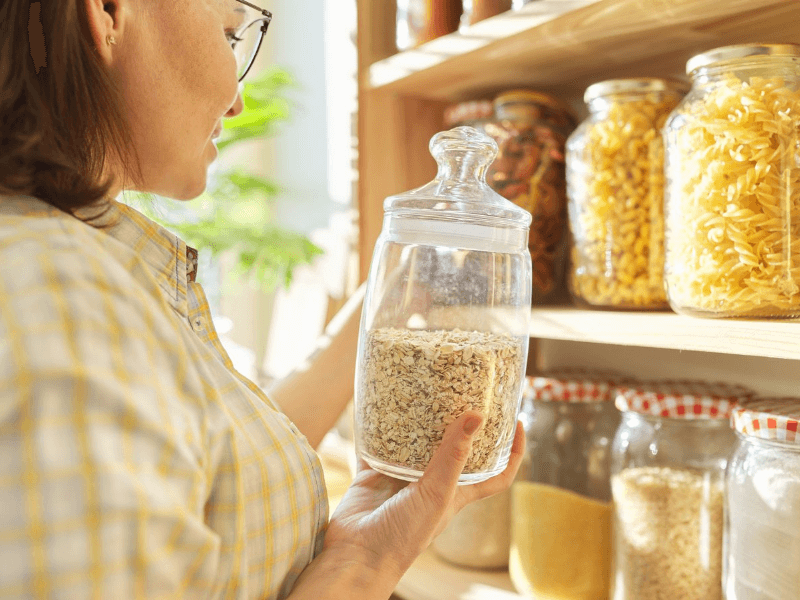
Disclosure: This post may contain affiliate links. If you purchase a product through one of our affiliate links we make a small commission from the sale at no extra cost to our readers.
DAILY HOMESTEAD TASKS
In order to keep the homestead running smoothly, some daily tasks can’t be missed. So whether you’re an urban homesteader like I am, or you have 1000 acres in the countryside, keeping these daily homestead tasks on your radar will help your homestead run in tip top shape!
1) FEED AND WATER THE ANIMALS
Feeding and watering your animals every day is essential to keeping them healthy and producing!
It’s a part of the daily homestead routine that you have to get used to doing. Plus it gives you a chance to play with your fluffs!
That’s not to say, though, that you have to lug 5 gallon buckets back and forth every day.
We have systems in place to ensure that our chickens and quail are fed and watered daily, but we still go out to check on them – just in case!
Last year we actually built a chicken feeder that can hold 185 pounds of feed – about 3.5 bags! (You can watch how we built it here.)
Now, it’s not completely spill-proof, but it does allow up to only feed them about once per month. Not too bad!
And after that, we built a rainwater collection system off the roof of our chicken coop. It’s connected to our poultry nipples (which are amazing, btw) and prevents the water from getting dirty with droppings.
This way, we never have to lug water back and forth – we just go check on them and fix anything that breaks once in a while!
2) CHECK ON THE ANIMALS FOR HEALTH ISSUES
Just like you regularly check your health, it is important to check on your animals’ health regularly.
So while you’re out there feeding and watering them, just keep an eye out for any health issues.
This can include anything from a limp to mucus coming out of places it shouldn’t – but usually it’s pretty obvious when your animals are sick.
After all, animals look up to their keepers to keep them healthy – so if you’re not paying attention to them, they won’t be able to take care of themselves!
Plus, if you notice any health issues right away, it becomes much easier to take care of whatever it is. And you’ll definitely get more productivity from healthy animals!
3) CLEAN OUT THE POOP
Do you want to lie in a place that is wet, messy, and filled with poop?
Neither do your animals!
Which makes cleaning out the poop a daily chore.
The frequency of when you actually need to do this will depend on how many animals you have, and your animal setup. But picking up poop from around your yard, inside your animal stables, sheds, coops, and other animal housing is essential to keeping them healthy!
This will prevent droppings from getting into the animal’s water, the animals eating droppings, and bacteria and disease from spreading.
4) WALK THE GARDEN
Walking your garden is an important part of your daily routine because it allows you to see what’s going on and take note of any issues that arise.
I walk the garden every morning (you can watch my exact garden morning routine here) and it really helps me catch pests and disease early, as well as enjoy all my hard work!
Walking the garden daily also helps you check any systems to make sure they’re working properly – like if you have drip irrigation in place.
Plus, there’s nothing like watching the flowers bloom first thing in the morning with a cup of coffee in your hands!
5) HARVEST VEGETABLES
Another thing you must do daily (or almost daily) is harvest anything that is ready to be picked.
I know there are times where I’ve missed a few days of harvesting and had to throw away overly ripe tomatoes, or noticed that my beans are drying right on the vine!
Harvesting regularly ensures that you are able to use or preserve the (literal) fruits of your labor. And keeps other critters away from your hard-earned veggies.
Plus, the best part of gardening is getting to eat what you grow – in my opinion!
6) TRELLIS VEGETABLES
There are certain vegetables – like pole beans – that will literally grow several inches in a day.
Which makes daily trellising a huge part of homesteading!
Unless you’re okay with your garden running wild – which if that’s your thing then more power to you!
But for me, trellising is essential to keeping my garden orderly. Plus, it helps to keep plants from rotting and being attacked by pests – which is easier if they’re just laying on the ground.
And this doesn’t have to be time consuming.
It really only takes me a few minutes to get my veggie plants trellised since I do this at the same time as I walk through the garden. And it makes a huge difference for the health of your plants!
7) COLLECT EGGS
Collecting your eggs is the best part of keeping backyard chickens for eggs! After all, if you want fresh eggs, you’ll have to go get them from the coop before you can cook them.
And even though they all look like eggs, I love seeing that some have speckles, some are blue, and some have different color variations due to the bloom.
It just feels nice to walk out with a basketful of fresh eggs! Even when I have too many, I always find something to do with the extra eggs!
Plus, collecting eggs is essential for keeping the eggs fresh – no one wants to eat eggs that have been sitting in 95 degree weather for multiple days!
And making sure to collect eggs daily will prevent a broody hen from sitting on her clutch – which is important if you don’t want baby chicks!
8) TAKE CARE OF THE NESTING BOXES
No one wants to collect dirty eggs. And keeping your eggs clean starts with the nesting boxes!
For the most part, your hens won’t do their business where they lay their eggs. But every now and again I’ll find droppings in the nesting boxes – and eggs covered in poop. Ick!
So replacing any soiled pine shavings with new, clean material allows your animals to be comfortable which increases productivity – and keeps your eggs clean!
At the same time – chickens will routinely toss out some of the pine shavings from inside their nesting boxes. So every time you’re collecting eggs, just make sure to check if they need more straw or pine shavings in there.
This will keep your chickens happy – and your eggs clean and not broken!
9) MILKING
Milking your cow or goats is a daily homesteading task that you cannot escape if you have animals in milk on your homestead.
Not milking daily can actually harm your animals, causing injury and sickness!
Which means that you should think carefully and consider the implications of letting your animals breed.
And unless you’re dedicated to the time commitment of milking, it’s best to keep breeding pair apart.
A good way of controlling the time commitment however, is to keep a nursing calf with your dairy cow so that the calf can help you with this chore.
In this case you wouldn’t need to milk as much, but you would still need to check in on the animals to ensure that everything is running smoothly!
10) COOKING
A lot of the time spent “taking care of the homestead” is actually cooking.
Because if we don’t cook, we don’t eat.
Basically we try to limit the amount we go out to eat – for financial as well as health reasons.
By cooking the food that we raise and grow on our homestead, we ensure that the food is not ridden with pesticides and we save money at the same time!
So on a weekly basis I bulk cook. Things like pasta noodles, bread for the week, homemade yogurt, and preserve any extra veggies from the garden.
And then I cook from scratch daily – often using those same things I made in bulk at the beginning of the week!
It helps that I love to cook since cooking does take a fair bit of time. But even if you’re not too fond of cooking, doing a little bit of meal prep at the beginning of the week can go a long way!
11) ADD TO THE COMPOST PILE
Gardening and homemade compost go hand in hand. So it’s no wonder that many urban homesteaders also have compost piles in their backyards!
The main way that I add to my compost bin is by saving kitchen scraps. This can be fruits and vegetables that have gone slightly bad, extra herbs from cooking, or even eggshells.
So every day when I’m cooking, I simply keep adding to the countertop bin I use to collect scraps. And then when it fills up, I take the whole thing outside and add those scraps into my compost bin.
Not only is this a great way to reduce waste, but it’s also a great way to save money gardening!
Compost can get expensive, and making it yourself is perfect for top dressing your garden beds at the beginning of every season!
Just make sure you know exactly what you can and can’t add to your compost. Because if you add the wrong things it can become smelly or even fail to decompose!
12) FOOD INVENTORY
Food is one of the main parts of keeping a homestead running.
Growing a garden for food, raising livestock for food, and preserving food for later.
So making sure you have enough in storage (or on the way to the freezer) is an essential homestead chore.
Even if you don’t raise your own food on your homestead, making sure you are well stocked will prevent last-minute rushes to the grocery store. And ensure you are ready should something happen (like a global pandemic!)
To me this is not something I sit down and spend time on. But rather, something I make a mental note of as I’m cooking and working around the homestead.
Oh we’re out of bread? Get out the bread machine.
Running low in pasta in the pantry? Set aside time to bulk make some noodles.
One of our laying chickens go missing? Maybe we need to hatch out a few extras.
Taking these things into account while going about your other daily tasks will help keep your food inventory on track and ensure you’re prepared for whatever happens!
HOW TO PREPARE FOR HOMESTEADING
Before starting a homestead, there are steps you can take to prepare yourself.
First off, homesteading can be daunting. So deciding that this is something you’re wholeheartedly committed to is step number one.
Next it’s time to research.
Not every homestead is the same.
Some of us raise chickens. Some raise goats. Some of us only garden.
And then there’s some of us that decide we want it all!
Do you research ahead of time to ensure you won’t be overwhelmed later on.
Now it’s time to create goals.
Once you’ve done your research and decided what you want on your homestead, it’s time to create manageable goals – manageable being the key word. Do yourself a favor and give yourself extra time to achieve these goals. And take it one step at a time.
For example, build the chicken coop first. Then get chickens!
Hopefully these daily homesteading tasks will keep you on track and your homestead running smoothly! And if there’s anything that you don’t have – like animals in milk – just scratch those off your list and enjoy the extra time!
pin daily homestead tasks!
